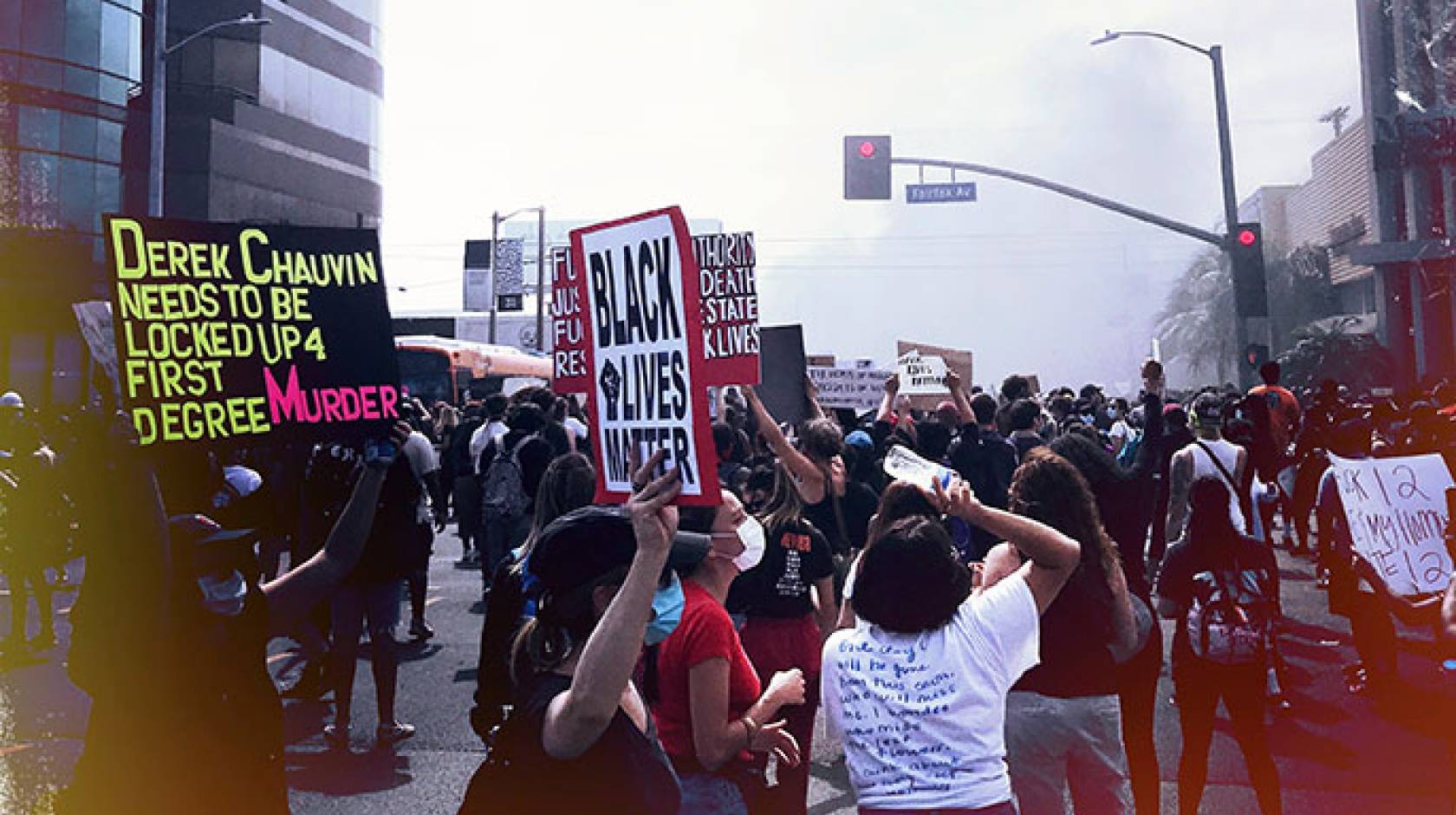UCLA

On May 25, George Floyd, 46, was killed when white Minneapolis police officer Derek Chauvin kneeled on his neck, pinning him to the ground. In one week since then, people across the country and around the world have mobilized to protest this latest example of fatal police violence against an African American person.
In some cities, the demonstrations have involved physical confrontations with police, destruction of property (including police cars) and looting of private businesses.
That all of this is happening months into a pandemic that shows no signs of ending — even as cities and states start reopening businesses — has so many of us deeply saddened and enraged. Some people are also confused, as they sympathize with the protestors and the righteousness of their cause, but recoil at the images of fires on their neighborhood streets and people looting stores in their communities.
In the past few days, UCLA faculty have been quoted in major news outlets around the world, offering their insights, expertise and perspectives to help people more clearly understand what is happening, the history of institutional racism that’s fueling the anger, why the words people choose to describe what’s happening matter so much and how the pandemic shapes our reactions.
This page will be updated periodically.
Tananrive Due is an award-winning author and a lecturer in UCLA’s Department of African American Studies. She wrote a personal essay that appeared June 1 on Vanity Fair’s website (excerpted below) about how the killing of George Floyd and the reaction to it connects to her own childhood experiences and memories of police getting away with killing an African American man named Arthur McDuffie in Miami in 1980.
Every city’s new scream of pain sweeps my mind back to May 17, 1980 — the day my childhood ended. On that day the police officers charged with killing Arthur McDuffie were acquitted.
McDuffie was a 33-year-old black motorcyclist (an insurance salesman and former Marine M.P.) who had led police on a high-speed chase before he coasted to a stop at the freeway exchange. As many as 12 police officers swarmed him, full of rage. While McDuffie was handcuffed, they beat him so badly with heavy flashlights that the coroner said his skull looked like “a cracked egg.” The officers then damaged his motorcycle and crafted a lie, saying he had been injured in a crash. McDuffie died days later.
Arthur McDuffie might have died under the cloud of the police officers’ lie if not for Miami Herald reporter Edna Buchanan, who got a tip and investigated his death, exposing the conspiracy to hide his murder. After the exposé, several officers were tried for manslaughter—which, even as a child, didn’t seem like a powerful enough charge to me. Even so, an all-white jury in Tampa acquitted them. I felt stunned and shattered as I watched the news crawl silently across my television screen on a sleepy Saturday afternoon.
He didn’t matter to them, I thought. Our lives don’t matter.
It was almost too big for my mind to accept. My parents were civil rights activists, so I knew how bad things had been back in the 1960s from their stories of fire hoses and tear gas and jail cells and beatings. But 1980 was the first time I understood how Jim Crow was still hiding inside the criminal justice system. I was pledging allegiance to the same flag as my white classmates at school, but there was no such thing as “liberty and justice for all.” Although the Black Lives Matter movement would not be born until more than 30 years later, Arthur McDuffie was my first Black Lives Matter moment.
In this USA Today article from Saturday, May 30, Darnell Hunt, sociologist and dean of the division of social sciences in the UCLA College, and Robin D.G. Kelley, the Gary B. Nash Professor of U.S. History, offered critical insights into the language used to describe what’s happening.
On social media, users called the arson and looting “disgusting” and “reprehensible.” In response to a trail of vandalism across downtown Louisville, Kentucky, where EMT Breonna Taylor was fatally shot by police in March, Mayor Greg Fischer said the “violence and destruction is absolutely unacceptable.” President Donald Trump called the protesters in Minneapolis “thugs.”
“I’m 58 years old now. I don’t remember a year that there wasn’t half a dozen cases, spectacular cases of police violence. You could do a New York Times front page, just like you did of the COVID deaths, and easily get 100,000 names, beginning in 1960, of people who died,” said Robin Kelley, a professor of history at UCLA who studies social movements in the USA. “My wife asked me this question last night, ‘Do you think this is right?’ I said, ‘What other choice do people have?’”
Later in the article, the question of whether to describe the protests as “violent” comes up.
Kelley questions the term’s use when “violence” is defined as attacks against property, rather than against people.
For nearly nine minutes, white Minneapolis police officer Derek Chauvin knelt on Floyd’s neck as he pleaded for his life, gasping for air and calling for his mother. Most rioters set fires, sprayed graffiti and smashed vehicles.
Hunt is also quoted on language, specifically the use of the words “riot” and “looting.”
Language choices matter: The term “riot” is loaded, and it’s why many use “rebellion” instead, experts said. One suggests reckless violence. The other signifies political resistance to oppression.
“The term ‘riot’ tends to connote a senseless venting of frustration, of destroying your own community and all these other things that are counterproductive, as if there couldn’t be political value in urban unrest and forcing the system to examine itself,” said Darnell Hunt, dean of social sciences and a professor of sociology and African American studies at UCLA.
Hunt argued that the term “looting” minimizes the political implications of what people are doing when they rob stores.
During the L.A. riots in 1992, which erupted after four LAPD officers were acquitted in the beating of Rodney King, there were scenes of people “looting” basic necessities, he said.
“You had a huge immigrant population that was barely getting by, barely surviving, and people were going to drugstores and ‘looting’ diapers, things to make ends meet in their families,” he said. “To minimize that as just, ‘Oh, people are just looting,’ completely robbed it of the political content and the political possibilities that people are trying to communicate by taking a risk and getting involved.”
Kimberlé Crenshaw of UCLA School of Law was interviewed by KPFA about racism, intersectionality, COVID-19 and the protests around the killing of George Floyd. (Approx. 24:00 mark)
We are now in the moment in which many people are grieving, having seen an African American man being killed. Deliberately, it seems. His suffering not being heard, his pleas for his life being disregarded, officers seemingly taking this as just another day at the office, snuffing out another life. The inhumanity of it, I think, is shocking to so many people, and at the same time, I struggle to hold the unfathomable dimension of this man’s life being taken, along with the thousands of people who are dying every day from decisions that have been made to prioritize the economy, to prioritize the comfort, to prioritize the preferences and the privileges of some over the lives and the well-being of others.

Credit: iStock/Coast-to-Coast
Hunt also offered insights for a BBC story that explored why some “protests turn violent,” discussing the government’s role in escalating the tensions through the deployment of the National Guard and noting parallels between current events and previous protests against racial injustice.
Darnell Hunt, dean of social sciences at UCLA, believes police in the U.S. “ramped up their aggressiveness” over the weekend.
“Deploying the National Guard, using rubber bullets, tear gas, and pepper spray — these are a range of police tactics that can exacerbate an already tense situation.”
Later in the article, Hunt provided historical context for what’s happening specifically in Los Angeles and more across the country.
Prof Hunt has studied the 1992 Los Angeles riots, which were sparked after four white police officers were acquitted over the videotaped beating of black motorist Rodney King.
He says there is “a long history of targeting, or selectivity,” in vandalism and looting. “In the L.A. uprisings, you’d often see ‘minority owned’ spray painted on minority businesses, so that people would bypass those.”
However, both Prof Stott and Prof Hunt caution that looting is complicated — especially as lots of people with different motivations take part, including people in poverty or organized criminals.
The idea that violent protests are targeted and meaningful events to those taking part can also explain why looting occurs in some protests, but not others.
...
Ultimately, however, riots can be a symptom of deep-seated tensions and complicated issues that don’t have an easy solution.
Prof Hunt says this week’s U.S. riots are the most serious ones since 1968 — after Martin Luther King was assassinated.
“You can’t think about police brutality, and the profiling of certain communities, without thinking about the inequalities that exist in society and fuel those concerns,” he says.
“The George Floyd case was not the cause — it’s more like the straw that broke the camel’s back. You could argue even the police killings are symptoms — the underlying cause is white supremacy, racism and things the U.S. has not fundamentally dealt with.”
Hunt and Kelley were also interviewed by the Washington Post in a story published June 1. Retailers and restaurants across the U.S. close their doors amid protests
The theft of T-shirts, computers and food appears to run counter to the message from demonstrators who have filled streets in cities and towns from coast to coast following the death of George Floyd, some professors who study the topic said. The looting also can feel distinct from the unrest’s vandalism and property destruction.
But, said UCLA historian Robin Kelley, “every single rebellion and uprising has included it.”
Looting is often the result of normally law-abiding people taking advantage of a chaotic moment, especially when they are suffering economically, Kelley said.
It occurred often during the violent unrest in American cities of the late ’60s and early ’70s. It happened after Hurricane Katrina devastated New Orleans. It was a part of the 1917 East St. Louis riots, when white people killed and stormed the homes of black residents — stealing rugs and lamps, Kelley said.
Now, during the COVID-19 pandemic and with 40 million people having filed for unemployment, “I was shocked there wasn’t more looting,” Kelley said of the current protests. “We’re dealing with an economic crisis.”
In that same article, Hunt offered comparisons to the 1992 L.A. riots that was sparked by the acquittal of the police officers who beat Rodney King.
The weekend’s actions were reminiscent of the Los Angeles Rodney King protests in 1992, said Darnell Hunt, dean of social sciences at UCLA. In this case, though, the destruction did seem to take place in more affluent neighborhoods, he said. Some business owners put up signs noting it was a minority-owned store to try to be spared.
Not all of them were saved, according to reports on social media.
The protests are not just a critique of police brutality, Hunt said, though that is the main issue at play.
“It’s an explosion of frustrations and anger about a range of interconnected structures in our society that have disproportionately undermined the livelihoods of people of color, particularly African Americans,” he said.
A Vox article published May 30 cited a study by UCLA School of Law’s Joanna Schwartz that helped explain how governments are insulated from the consequences of police violence against people.
Even if a civil rights plaintiff overcomes qualified immunity, many jurisdictions have indemnity laws protecting police from civil suits. Under these laws, the government agrees to pay any damages awarded against an officer. Indeed, these indemnity laws are so common that a 2014 study by UCLA law professor Joanna Schwartz found that “during the study period, governments paid approximately 99.98% of the dollars that plaintiffs recovered in lawsuits alleging civil rights violations by law enforcement.”
Laura Abrams, professor of social welfare at the UCLA Luskin School of Public Affairs, offered key perspectives to LAist on how the economic downturn caused by the pandemic intersects with choices about what to cut in the city of Los Angeles’ budget.
The union representing the LAPD says uniformed police are expected to provide an ever-expanding array of services, especially during the COVID-19 pandemic.
“In addition to traditional policing, our officers are on the front line of providing services to our community during this pandemic, from helping to transport homeless residents to shelters to providing security at these shelters,” the LAPPL [Los Angeles Police Protective League] said in a statement. “We cannot shelter in place and we put ourselves in harm’s way daily.
But activists don’t agree that LAPD funding levels should be justified by pointing out the multiple roles that police officers fill when they encounter people on the street.
“Police officers, even when well-intentioned, are not social workers,” said Laura Abrams, chair of social welfare at UCLA’s Luskin School of Public Affairs.
On a conference call organized by the Stop LAPD Spying Coalition, Abrams described the special training involved in becoming a certified social worker — including adhering to a code of ethics and gaining the ability to appropriately advocate for vulnerable communities.
“These skills or training cannot be paralleled by any work in law enforcement,” Abrams added. “Social workers are also on the front lines right now. And they’re getting cuts and laid off.”
In a message to the campus community, 37 campus leaders, including Chancellor Gene Block and the presidents of the undergraduate and graduate student associations, joined together to send a message expressing their collective anger, sadness and solidarity.
We must never let that indifference to human suffering become our own. We must never deaden our hearts to the pain of others. Our fundamental values demand that we care.
At UCLA, we believe deeply that equity, respect and justice are central to the character of our institution, to the health of our democracy and to the well-being of our world. Still, we recognize that UCLA also can and must do better. As campus leaders, we recommit ourselves to ensuring that our policies and actions value the lives, safety and dignity of every Bruin.
Read a statement from UC President Napolitano and Board of Regents Chair John A. Pérez here.

